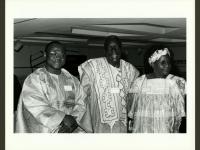This is an introductory lesson on African Immigration meant to give a background an overview of the issue.
African Immigration: False Portrayals in the Media
African Immigration: False Portrayals in the Media
Essential Questions
Objectives
Students will be able to:
- Analyze how Africa is portrayed in the media and comprehend how false assumptions affect African immigrants by completing an op-ed writing assignment on African immigration.
- Make comparisons between how the media depicts Africans and the realities of African immigration by analyzing media images and portrayals of Africa.
Other Materials
Suggested Instructional Procedures
- Ask students to watch television and examine newspapers for a pre-determined time to note how Africa and Africans are portrayed in the media. This can be completed as homework the night before or the teacher can collect resources to show in class. Students should record their findings using the following questions as a guide:
- How do the media portray Africa and Africans in words and images? (i.e. poor, rural, warring, tribal, malnourished)
- Are any of these images stereotypical? How can you spot a stereotype? (i.e. All of Africa is a jungle, All Africans live in villages or around wild animals)
- Is there other information about Africa that doesn’t fit into these stereotypes? (Only a small part of Africa is jungle, many Africans live in large cities including many African immigrants who have moved to Philadelphia)
- Ask students to imagine going to another country where no one has ever heard of the United States. Students can reflect on how people in foreign countries form assumptions about life in America by asking these critical questions of themselves:
- How might have people found out your country? (News, Internet, Television)
- What are the most popular shows on television? What would someone learn about on these shows? What assumptions might they make about your country, based on these television shows? What would be true? What would be untrue?
- What assumptions might someone make about your country based on the news or Internet?
- How would you feel about people judging you based upon what they saw on television, news, or the Internet?
- How would you feel about people judging you based upon their assumptions about your country and its people?
- Engage the class in discussion using the following guiding questions:
- What do you know about countries in Africa? Based on what sources?
- What do you assume about Africans or African immigrants based on this knowledge? How do you think they feel about being seen this way?
- What are some reasons why African immigrants are moving from their homes to come to the United States?
- Using information from Extended Lives: The African Immigrant Experience in Philadelphia, give a lecture about the realities of African Immigration to the United States and Philadelphia. Engage in discussion about the discrepancies between reality and media portrayal.
- Have students complete a short op-ed on the subject of African Immigration comparing their thoughts on it before and after this lesson.
Vocabulary
Ethnic group: people of the same race or nationality who share a distinctive culture
Immigrant: a person who comes to live permanently in a foreign country
Stereotype: a set of inaccurate, simplistic generalizations about a group that allows others to categorize them and treat them accordingly

Plans in this Unit
Grade Level
Duration
Standards/Eligible Content
About the Author
These lessons were created by Stephanie Felix and Katherine Wilson. Updated for SAS by Danielle J. Gross, Education Intern, Historical Society of Pennsylvania.
Teacher Advisory Committee for the Project:
Alice Asbury, J.S. Jenks School, Philadelphia, PA
Asia Austin Colter, Imhotep Institute Charter High School, Philadelphia, PA
Karen V. Davis, Henry C. Lea Middle School, Philadelphia, PA
Melvin Garrison, Office of Curriculum Support, School District of Philadelphia
Pamula Hart, Myers Elementary School, Cheltenham, PA
Dr. Carolyn L. Holmes, African and African American Studies Department, School District of Philadelphia
Adolphus Jacobs, Preparatory Charter School, Philadelphia, PA
Tanya Kunevich, Lamberton Middle School, Philadelphia, PA
Margaret H. Lonzetta, World Affairs Council of Philadelphia
Patricia Mitchell Doe, Tilden Middle School, Philadelphia, PA
Dianne Partee, African and African American Studies Department, School District of Philadelphia
Stephanie Joy Tisdale, Central High School, Philadelphia, PA
Stephen Togba, Imhotep Charter School, Philadelphia, PA
Dr. Ali B. Ali-Dinar, African Studies Center, University of Pennsylvania
Attention Teachers!
Let us know how you used this plan and be featured on our site! Submit your story here.


